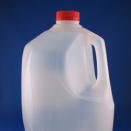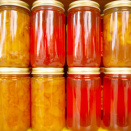Have some fun!
Plan fun, educational activities for your class or family!
Though officials and relief workers will be at task right after a true disaster, they just can't reach everyone immediately. Basic services such as electricity, gas, water, sewage, and telephones may not be in working order for days, or weeks. You may even be in a situation where you'll have to leave at a moment's notice.
When deciding what to include in your emergency kit, take into account your specific situation and think of the supplies you need to keep yourself clean, well-fed and healthy for three days. Don't forget special medications, perscriptions, supplies or equipment you may need.
Start with sturdy, portable, containers that you can carry without assitance. You may find it easier to have more than one container in order to store food items separate from toiletries & hygiene supplies. Remember that your family may need more items than listed below, but is a list to help you get started:

Stocking water reserves should be among your top priorities in preparing for an emergency. You should store at least a three-day supply of water for each member of your family.
Build a Water Storage Kit
If activity is reduced, healthy people can survive on half their usual food intake for an extended period and without any food for many days. Food may be rationed safely, except for children and pregnant women.
Build a Food Storage Kit
In a situation where a serious hazardous chemical spill has quickly caused a toxic atmosphere, it may be more dangerous to go through those toxic vapors or to attempt to outrun them than to stay in an existing structure.
Build a Shelter Kit